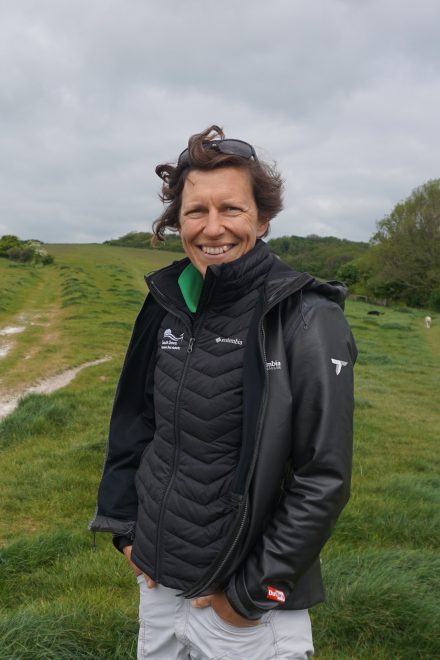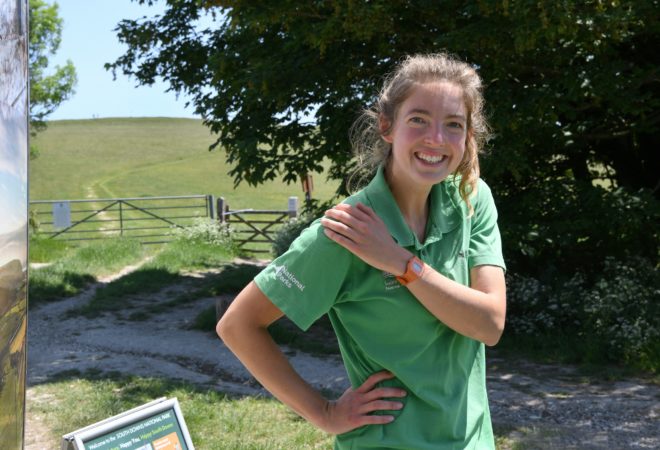World Female Ranger Day: Meet Phillippa and Chloe
June 9, 2023
It’s World Female Ranger Day this June, so we caught up with Lead Ranger for the Eastern Downs (around Brighton), Phillippa Morrison-Price…
 What made you think of becoming a ranger?
What made you think of becoming a ranger?
I love animals, wildlife, being practical and being outdoors. I had originally got a place to be a veterinary nurse at a University in London, but after a gap year in South Africa and Tanzania, working with various conservation projects, I got a place to do Nature Conservation in South Africa. I ended up swapping this for a place at Coventry University to study ecology, to be closer to my future wife and build up my experience in this country. It was only after I had graduated and I had a temporary job at East Sussex County Council that I saw a trainee ranger role come up and I realised that was the job for me! I didn’t get it though. I had to volunteer for a full year with Kent Wildlife Trust, getting all my tickets, before I was even considered.
What’s it like being a ranger in the South Downs National Park?
It’s a dream job! I get to work in an amazing landscape with amazingly knowledgeable people.
Can you describe your typical day?
No day is the same. You could be scrub clearing one day, putting in a gate on the South Downs Way or carrying out a survey for butterflies or chalk grassland plants on another. It’s hugely dependent on the season, so we tend to work in three-month rotations.
What’s the best and most difficult part of the ranger job?
The best part of the job is seeing your hard work pay off. I restored a defunct dew pond a few years ago. What had been a soggy puddle with a tree growing out of it is now a haven for wildlife. I was up there the other day watching great-crested newts bobbing up to the surface, then two grass snakes appeared and swam across it. There are lots of challenges to the role, but that’s what makes it interesting!
What’s been the highlight of your ranger career so far?
I don’t think I can name one single thing, it’s all in the day to day – the team I work with, the projects that go well, the wildlife you see.
What would you say to any youngster thinking of becoming a ranger?
Do it! Get out there an experience what it’s like, volunteer, go on guided walks, get to know your local wildlife.
Why do you love the South Downs?
I love the history, the story they tell, the wildlife they support and the opportunities they provide.
We also caught up with Chloe Goddard, Ranger for the Central Downs (around Chichester)

What made you think of becoming a ranger?
I didn’t know about Ranger jobs when I was at school but I knew I wanted to work outdoors doing something practical. I volunteered with my local Wildlife Trust and met the wardens there and was immediately inspired to pursue this career when I went out on my first task and the warden was using a chainsaw. Although my initial interest was sparked by a desire to learn to cut down trees, drive tractors and herd goats, I very quickly developed a knowledge of the landscape I was working in and became passionate about protecting and enhancing habitats for wildlife as well as wanting to share my new found understanding with other people.
Can you describe your typical day?
Nope, that’s what is so great. Every day is different – I work on different projects, different sites, with different people, in different seasons and in all weathers.One day I might be working with the local community to sow wildflower seeds in glades along a disused railway line which is now a cycle path.
Another day I might be showing a contractor a redundant pond site for which I have obtained grant funding to restore to the wildlife haven it once was.
I might spend a chilly winter’s day showing a volunteer group how to coppice hazel in an ancient woodland, kept warm by a fire burning the brash.
I might spend a tranquil summer day monitoring the dormouse population in the same woodland.
I might spend another day on a sunny chalk downland slope teaching a group of young people how to carry out a bioblitz, identifying as many of the numerous wildflowers, insects, birds and other wildlife as we can.
What’s the best and most difficult part of the ranger job?
I love working with community groups, volunteers, farmers and landowners who are passionate about doing their bit to ensure the habitats are there for wildlife to thrive. It’s really exciting to see such huge support for nature amongst the stake holders I work with.
What I find most difficult is facing challenges that often seem too big for us to overcome, that require revolutionary changes and government action, such as protecting our precious and delicate chalk stream habitats.
What’s been the highlight of your ranger career so far?
I have far too many to list but here’s a few: ringing endangered tree sparrow chicks for a monitoring programme, vaccinating badgers against TB as an alternative to culling to prevent the spread of disease, pond dipping with blind children and letting them experience this by holding a great crested newt, releasing pearl bordered fritillary butterflys and short tailed bumble bees back into habitats from which they’d been lost, finding a dormouse nest in a dead hedge I built to protect a hazel coppice site, watching a bittern boom at 4:30am whilst out on a marsh harrier survey.
What would you say to any youngster thinking of becoming a ranger?
Great choice, start by volunteering with any conservation organisation and you’ll learn there’s so much more to the natural places you used to walk through every day.
Why do you love the South Downs?
I love the South Downs because it’s where I live and where I work. I love feeling like I know a place so well and then realising I actually still know hardly any of it at all!
